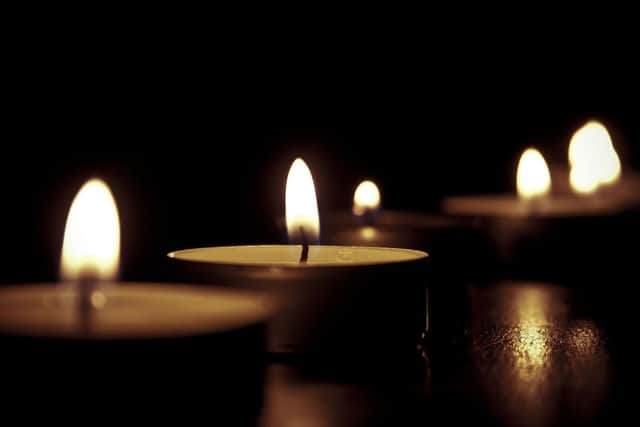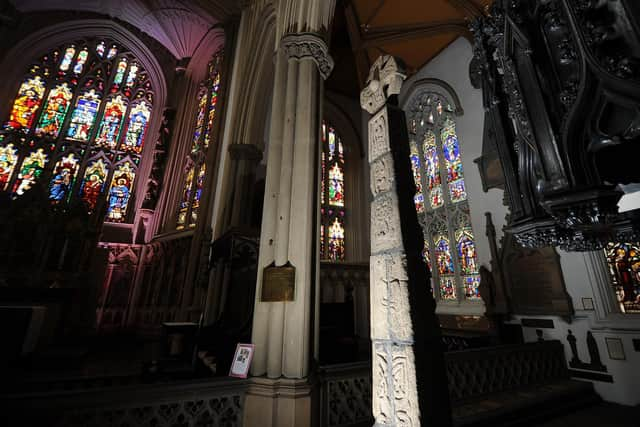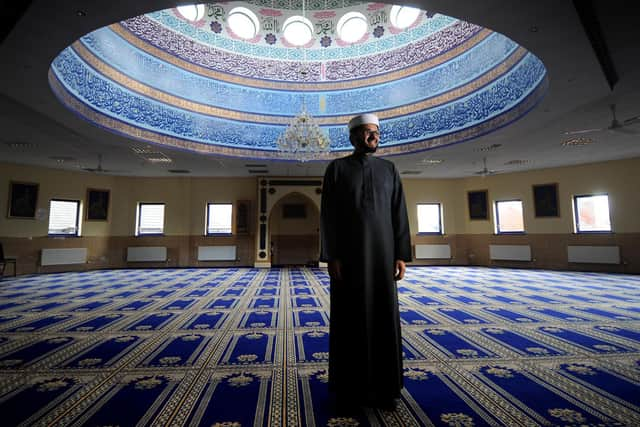How the city of Leeds is mourning loved ones during coronavirus lockdown
and live on Freeview channel 276
A minister is conducting a funeral on a grassed area outside a crematorium in Leeds but there is only him there.
There are no family members carrying the coffin into the chapel, there is no order of service and there are no other mourners. It is sad, it is solitary.
Advertisement
Hide AdAdvertisement
Hide AdBut looking from the window of the car is a grieving husband who is watching his treasured wife laid to rest.


Despite being married for 50 years he’s unable to be with his wife for her final journey. Simply, because of the coronavirus pandemic he is unable to attend and say farewell after a lifetime together.
But this isn’t unique – many families are being faced with the prospect of being unable to say goodbye properly to their loved ones. In this special YEP report, we look at how the restrictions connected with trying to halt the coronavirus death toll are impacting grieving families in their darkest hours.
With churches and religious buildings closed, the usual services where family and friends come together to pay their respects at a traditional service, to remember loved ones and be together to support are gone.
Guidelines
Advertisement
Hide AdAdvertisement
Hide Ad

Instead,current guidelines say for burials up to 10 people can attend that are only family from the same household or close relatives and the service should be over within 15 minutes.
For cremations, up to 10 family members are allowed to attend the crematorium grounds to see the coffin being taken into the chapel.
Rev Sam Corley, the Rector of Leeds, said while small services can be positive - it is, even for clergy, strange to conduct funerals in this way.
He said: “The church is not a building, it is about people. One of the things (about grief) is you feel completely alone, that the whole world is carrying on, you are left behind and nobody understands. Part of the funeral is being with other people and that helps a bit.”
Advertisement
Hide AdAdvertisement
Hide Ad

To make up for not being able to carry out family wishes in the usual way, Rev Corley is offering prayers to bereaved families over the phone or from the end of the driveway. As coffins are driven to the crematorium they will pause at meaningful places and he is encouraging people to write letters and light candles.
He said: “There is something beautiful about a small number of people together for a funeral. Although you have to keep distance there is a sense of intimacy and being able to focus on the person you are saying goodbye to. But, it feels odd when you turn around and there is not the normal crowd.”
Memorials
Rev Corley added that memorial services will be offered if families would like to hold one when lockdown is lifted.
He added: “After this (lockdown) life is going to be very different. There is going to be a need for that occasion where people come together and remember them.”
Advertisement
Hide AdAdvertisement
Hide AdAnd for members of the city’s other religious communities where practices after death differ - the impact is just as great.
Albert Chait is the senior minister at the United Hebrew Congregation. He said within the Jewish community there have not been more coronavirus deaths than by other causes but that there is an automatic assumption.
He said: “Society has forgotten that there are other diseases. Every death is sad and difficult for families and those that are mourning, but, the first question is ‘did they have coronavirus’ and maybe for those that have not, it is difficult to mourn in the same way.”
In the Jewish community following a death, registration takes place and the body is taken to the Jewish mortuary. Families gather at the synagogue and drive in convoy to the United Hebrew Congregation Ceremony at Gelderd Road for service and burial. This is within 24 hours and then the seven day religious observation of Shiva takes place where the family sits on low chairs, receives family and guests every day to mourn and pray.
Advertisement
Hide AdAdvertisement
Hide AdNow, the next of kin meets at the graveside for a shortened service and prayers are done at night via Zoom.
From Afar
Mr Chait said: “Any funeral we have at the moment is literally the ground-staff, myself and the family and by that I mean the very next of kin.
“I have had a situation where a loved one sat in the car and I did the service on the grassed area so that they could see. They had been married for 50 years. He was unable to literally be there at the funeral of his spouse because he was self isolating. He had to park in his car and watch it on Zoom and from afar.
“That was very emotional and I just thought, ‘how would I feel’ like that after being married for 50 years. It is just an awful situation.”
Advertisement
Hide AdAdvertisement
Hide AdThe mental health effects of this type of funeral when people are already grieving is something worrying other communities too.
Mental health fears
Jatinder Singh-Mehmi is from the Sikh Temple Gurdwara on Chapeltown Road.
He told the YEP: “The impact on people’s mental health will be really compounded. It is horrible when you lose somebody. Going through this process they need people and the community around them and they are just not there.
“A couple of people have died within the community recently, some from COVID, some not, but they are facing the same sort of challenges. We are going to have to think about ways of supporting these people.”
Advertisement
Hide AdAdvertisement
Hide AdSikh tradition sees the mourning process start immediately. People go to the family home all day, every day up to the funeral to bring food and support the family. There is an open coffin at the Gurdwara for the wider community to pay respects and the bereaved start the reading of religious script. After the service and cremation a gathering is usually held at the Gurdwara which is the central point. A small funeral is considered to be around 150 guests but on average there could be 400. Family from overseas visit and in some cases the ashes are returned to India to be scattered.
Now there is an open coffin for family only, the procession drives past the Gurdwara straight to the crematorium.
Mr Singh-Mehmi added: “This delays that process and when families get to meet they will probably go through the grieving process again. That will be hugely painful.”
Traditions relaxed
For the city’s large Muslim community - the age old Islamic traditions are also having to be “relaxed”.
Advertisement
Hide AdAdvertisement
Hide AdCustom upon a death is for people to visit the family in large numbers to console them and for the body to be washed prior to a service at the mosque and burial - all within a 24 hour period. Sometimes bodies are even flown back to families in Pakistan or Bangladesh.
Qari Asim, Imam at the city’s Makkah Mosque said: “None of that is happening, the body is taken straight to the cemetery. The visiting, the food preparation - essentially all the things to do with community together are taken away.
“The message to the community is that we are going through unprecedented times and we are trying to be understanding of the position and relaxing of the Islamic tradition.
“Faith communities are very much about being with each other and we have to re-configure virtual communities.”
A message from the Editor:
Advertisement
Hide AdAdvertisement
Hide AdThank you for reading this story on our website. These are challenging times but the team at the Yorkshire Evening Post need your support more than ever in the weeks ahead.
While I have your attention, I also have an important request to make of you. In order for us to continue to provide high quality and trusted local news on this free-to-read site, I am asking you - wherever possible and providing it is safe for you to do so - to also please purchase a copy of our newspaper.
Inevitably falling advertising revenues will start to have an impact on local newspapers and the way we continue to work during this period of uncertainty. So the support of our readers has never been more important as we try to make sure that we keep you connected with the city you live in during this time. But being your eyes and ears comes at a price. We need your support more than ever to buy our newspapers during this crisis.
Our team of trusted reporters are working incredibly hard behind the scenes - from kitchen tables and spare bedrooms - to look at how we can do this and your continued support to the YEP will help to protect its viability in the days and weeks ahead.
For more details on our subscription offers please visit www.localsubsplus.co.uk/YEP, email [email protected] or call us on 0330 4033004.
Thank you
Laura Collins
Editor